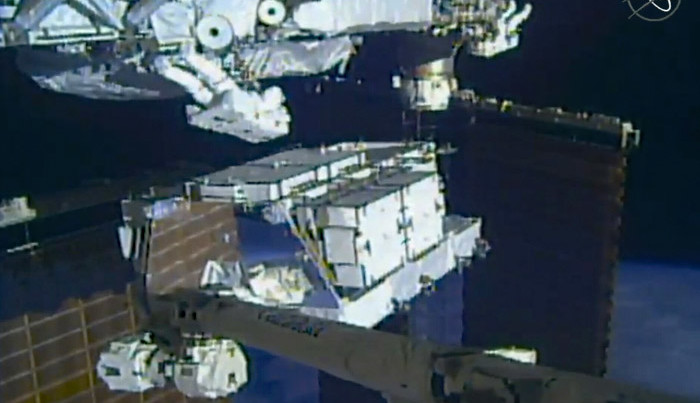Battery Upgrade for the ISS
October 08, 2019
on
on

Astronauts on board the International Space Station carried their first of five spacewalks on Sunday, October 6, 2019 to replace some aging batteries.
Astronauts Christina Koch and Andrew Morgan removed three old batteries during their spacewalk and installed two new ones that were delivered just a week ago. The new lithium-ion batteries have much better energy density so that each new battery is equivalent to two of the versions being replaced.
Koch and Morgan will get ready this Friday for further work 408 km above the surface of the earth. The 180 kg batteries are half the size of a domestic fridge and act as energy reservoirs for when the PV arrays on the ISS are shaded from the sun by the Earth. Astronauts have been working on the upgrade since 2017 and now over half way through the job. The batteries being replaced are ten years old; the new copies should last until the end of the ISS mission.
This latest battery changes are difficult because their position means they are out of reach of the stations 17 m robotic arm. They therefore require manual manipulation to swap them out. A number of spacewalks will be necessary to replace the twelve nickel-hydrogen batteries with six new Li-Ion batteries.
The batteries are so bulky that they block the astronauts' view of each other, so they rely on spoken exchanges to coordinate their efforts during each seven-hour spacewalk. NASA anticipates that all five remaining spacewalks will be completed by the end of the month.
Christina Koch is already two-thirds of the way through the mission which will total more than 300 days and make it the longest continuous spaceflight made by a woman.
Astronauts Christina Koch and Andrew Morgan removed three old batteries during their spacewalk and installed two new ones that were delivered just a week ago. The new lithium-ion batteries have much better energy density so that each new battery is equivalent to two of the versions being replaced.
Koch and Morgan will get ready this Friday for further work 408 km above the surface of the earth. The 180 kg batteries are half the size of a domestic fridge and act as energy reservoirs for when the PV arrays on the ISS are shaded from the sun by the Earth. Astronauts have been working on the upgrade since 2017 and now over half way through the job. The batteries being replaced are ten years old; the new copies should last until the end of the ISS mission.
This latest battery changes are difficult because their position means they are out of reach of the stations 17 m robotic arm. They therefore require manual manipulation to swap them out. A number of spacewalks will be necessary to replace the twelve nickel-hydrogen batteries with six new Li-Ion batteries.
The batteries are so bulky that they block the astronauts' view of each other, so they rely on spoken exchanges to coordinate their efforts during each seven-hour spacewalk. NASA anticipates that all five remaining spacewalks will be completed by the end of the month.
Christina Koch is already two-thirds of the way through the mission which will total more than 300 days and make it the longest continuous spaceflight made by a woman.
Read full article
Hide full article


Discussion (0 comments)